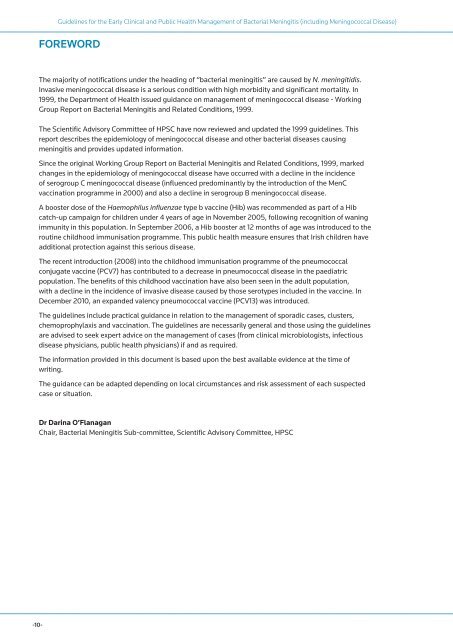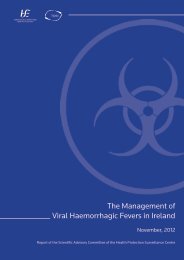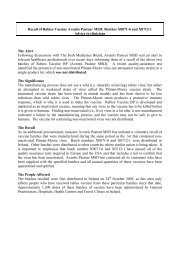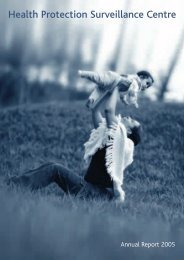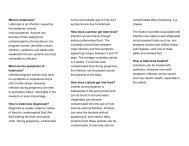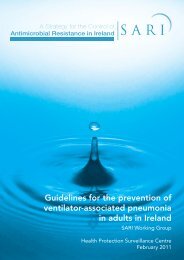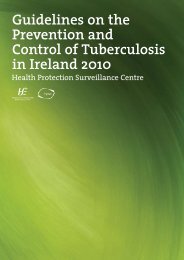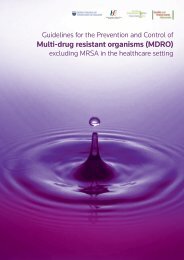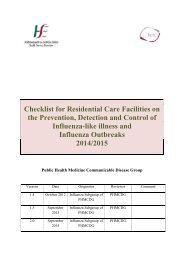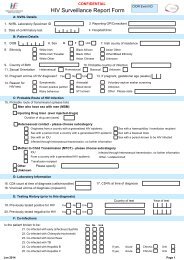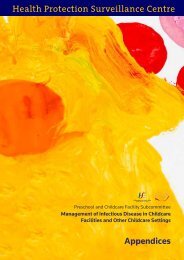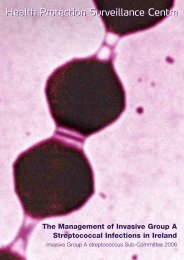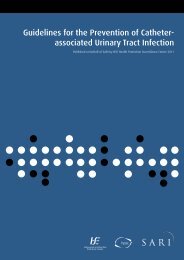Guidelines for the Early Clinical and Public Health Management of ...
Guidelines for the Early Clinical and Public Health Management of ...
Guidelines for the Early Clinical and Public Health Management of ...
Create successful ePaper yourself
Turn your PDF publications into a flip-book with our unique Google optimized e-Paper software.
<strong>Guidelines</strong> <strong>for</strong> <strong>the</strong> <strong>Early</strong> <strong>Clinical</strong> <strong>and</strong> <strong>Public</strong> <strong>Health</strong> <strong>Management</strong> <strong>of</strong> Bacterial Meningitis (including Meningococcal Disease)<br />
Foreword<br />
The majority <strong>of</strong> notifications under <strong>the</strong> heading <strong>of</strong> “bacterial meningitis” are caused by N. meningitidis.<br />
Invasive meningococcal disease is a serious condition with high morbidity <strong>and</strong> significant mortality. In<br />
1999, <strong>the</strong> Department <strong>of</strong> <strong>Health</strong> issued guidance on management <strong>of</strong> meningococcal disease - Working<br />
Group Report on Bacterial Meningitis <strong>and</strong> Related Conditions, 1999.<br />
The Scientific Advisory Committee <strong>of</strong> HPSC have now reviewed <strong>and</strong> updated <strong>the</strong> 1999 guidelines. This<br />
report describes <strong>the</strong> epidemiology <strong>of</strong> meningococcal disease <strong>and</strong> o<strong>the</strong>r bacterial diseases causing<br />
meningitis <strong>and</strong> provides updated in<strong>for</strong>mation.<br />
Since <strong>the</strong> original Working Group Report on Bacterial Meningitis <strong>and</strong> Related Conditions, 1999, marked<br />
changes in <strong>the</strong> epidemiology <strong>of</strong> meningococcal disease have occurred with a decline in <strong>the</strong> incidence<br />
<strong>of</strong> serogroup C meningococcal disease (influenced predominantly by <strong>the</strong> introduction <strong>of</strong> <strong>the</strong> MenC<br />
vaccination programme in 2000) <strong>and</strong> also a decline in serogroup B meningococcal disease.<br />
A booster dose <strong>of</strong> <strong>the</strong> Haemophilus influenzae type b vaccine (Hib) was recommended as part <strong>of</strong> a Hib<br />
catch-up campaign <strong>for</strong> children under 4 years <strong>of</strong> age in November 2005, following recognition <strong>of</strong> waning<br />
immunity in this population. In September 2006, a Hib booster at 12 months <strong>of</strong> age was introduced to <strong>the</strong><br />
routine childhood immunisation programme. This public health measure ensures that Irish children have<br />
additional protection against this serious disease.<br />
The recent introduction (2008) into <strong>the</strong> childhood immunisation programme <strong>of</strong> <strong>the</strong> pneumococcal<br />
conjugate vaccine (PCV7) has contributed to a decrease in pneumococcal disease in <strong>the</strong> paediatric<br />
population. The benefits <strong>of</strong> this childhood vaccination have also been seen in <strong>the</strong> adult population,<br />
with a decline in <strong>the</strong> incidence <strong>of</strong> invasive disease caused by those serotypes included in <strong>the</strong> vaccine. In<br />
December 2010, an exp<strong>and</strong>ed valency pneumococcal vaccine (PCV13) was introduced.<br />
The guidelines include practical guidance in relation to <strong>the</strong> management <strong>of</strong> sporadic cases, clusters,<br />
chemoprophylaxis <strong>and</strong> vaccination. The guidelines are necessarily general <strong>and</strong> those using <strong>the</strong> guidelines<br />
are advised to seek expert advice on <strong>the</strong> management <strong>of</strong> cases (from clinical microbiologists, infectious<br />
disease physicians, public health physicians) if <strong>and</strong> as required.<br />
The in<strong>for</strong>mation provided in this document is based upon <strong>the</strong> best available evidence at <strong>the</strong> time <strong>of</strong><br />
writing.<br />
The guidance can be adapted depending on local circumstances <strong>and</strong> risk assessment <strong>of</strong> each suspected<br />
case or situation.<br />
Dr Darina O’Flanagan<br />
Chair, Bacterial Meningitis Sub-committee, Scientific Advisory Committee, HPSC<br />
-10-


